#South Africa state visit 2022
Photo

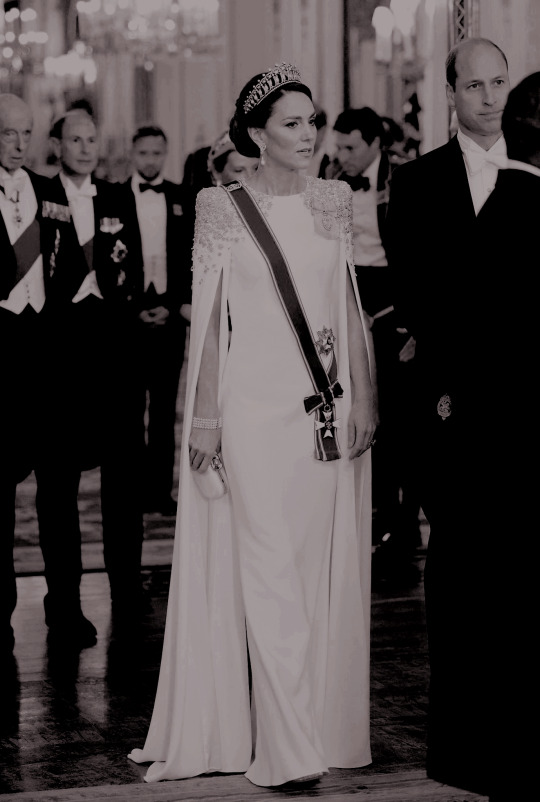
“To be a princess is to always look your best.”
#Kate middleton#princess of wales#2022#nov22#state events#tiara events#I am obsessed#old school royal glamour#bonus points for those who know where the quote is from#South Africa state visit 2022
148 notes
·
View notes
Text
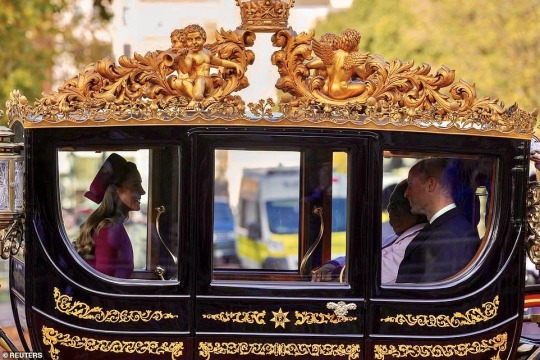
#South Africa state visit 2022#british royal family#will and kate#princess of wales#prince of wales#kate middleton
158 notes
·
View notes
Text

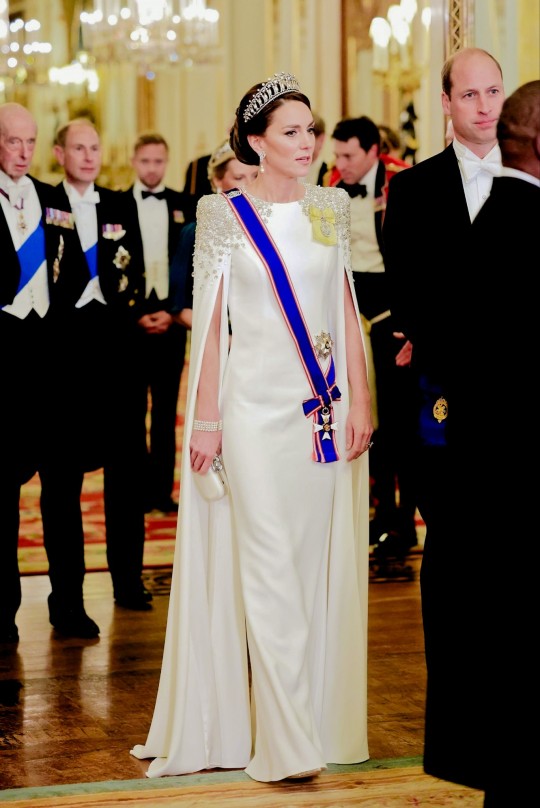
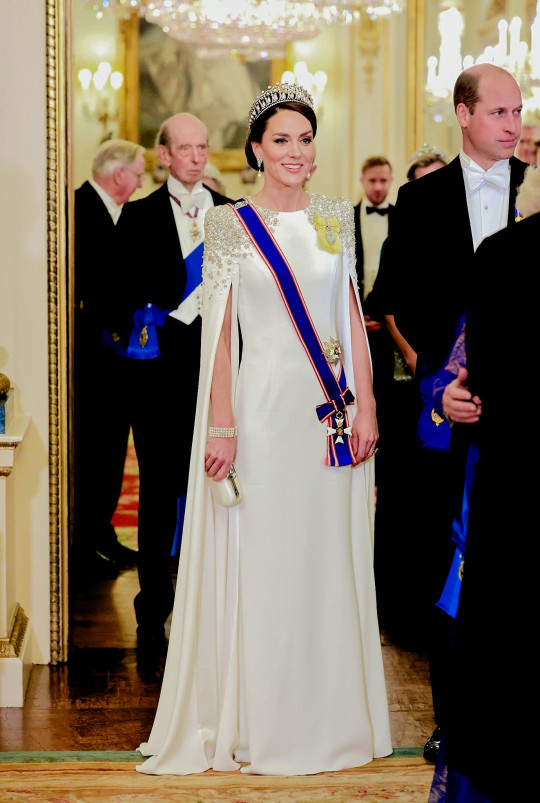
The Prince and Princess of Wales attend a State Banquet for President Cyril Ramaphosa on day 1 of his state visit to The United Kingdom, at Buckingham Palace in London, England -November 22nd 2022.
#prince william#prince of wales#princess of wales#british royal family#england#2022#november 2022#state visit#state visit 2022#south africa state visit 2022#south africa state visit#the wales#my edit
86 notes
·
View notes
Photo
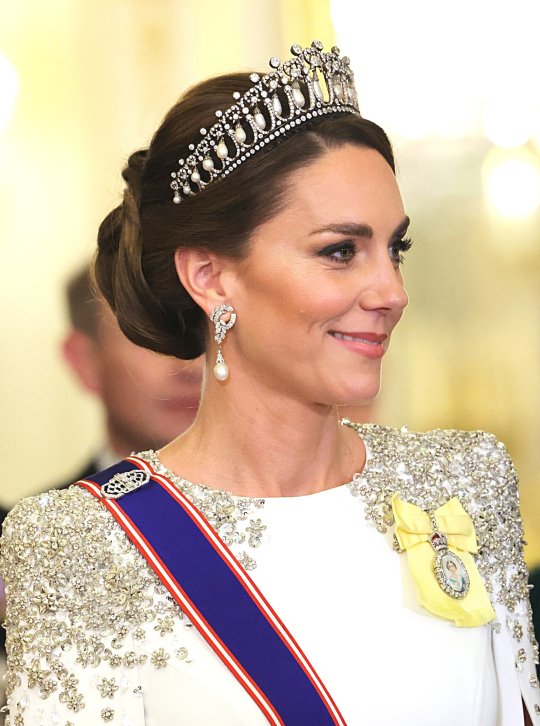
December 6, 2022: The Princess of Wales attends the state dinner for South Africa at Buckingham Palace.
#princess of wales#princess kate#brf#british royal family#december 2022#state visits#state dinners#south africa to uk 2022#tiaras#white tie#kate's engagements#kate's hair#mine
150 notes
·
View notes
Text
Western support for Israel’s assault on Gaza has poisoned efforts to build consensus with significant developing countries on condemning Russia’s war against Ukraine, officials and diplomats have warned.[...]
In the flurry of emergency diplomatic visits, video conferences and calls, western officials have been accused of failing to defend the interests of 2.3mn Palestinians in their rush to condemn the Hamas attack and support Israel.
In the first days after Hamas’s assault, some western diplomats worried that the US was giving carte blanche to Israel to attack Gaza with full force.
That had eroded efforts since Russia’s 2022 invasion of Ukraine to build consensus with leading states in the so-called Global South — such as India, Brazil and South Africa — on the need to uphold a global rules-based order, said more than a dozen western officials.[...]
“We have definitely lost the battle in the Global South,” said one senior G7 diplomat. “All the work we have done with the Global South [over Ukraine] has been lost . . . Forget about rules, forget about world order. They won’t ever listen to us again.”
Many developing countries have traditionally supported the Palestinian cause, seeing it through the prism of self-determination and a push against the global dominance of the US, Israel’s most important backer.[...]
Some American diplomats are privately concerned that the Biden administration’s response has failed to acknowledge how its broad support of Israel can alienate much of the Global South.[...]
Russia and its ally China have cultivated warm ties with the Palestinians. Russia’s president Vladimir Putin on Tuesday met Chinese leader Xi Jinping in Beijing.
“What we said about Ukraine has to apply to Gaza. Otherwise we lose all our credibility,” the senior G7 diplomat added. “The Brazilians, the South Africans, the Indonesians: why should they ever believe what we say about human rights?”[...]
Just four weeks before the Hamas assault on Israel, leaders from the US, EU and western allies attended the G20 summit in New Delhi and asked developing nations to condemn Russia’s attacks on Ukrainian civilians in order to uphold respect for the UN charter and international law.
Since last Sunday, many of those officials told the Financial Times they have had the same argument read back at them in demands for condemnation of Israel’s retaliatory assault on Gaza, and of its decision to restrict water, electricity and gas supplies there.
17 Oct 23
783 notes
·
View notes
Text
Palestine Summary: March 13 to March 15, 2024. From "Let's Talk Palestine". Quote:
March 13. Day 159
🇬🇧 In an unprecedented move for a Western state, UK granted asylum to Palestinian w/ Israeli citizenship, overturning their 2022 rejection. His request was largely based on risk of persecution under Israel’s “apartheid” regime. This is first official Western recognition Palestinian reality under Israeli apartheid, even if the UK didn’t explicitly label it apartheid. More on abuse of Palestinians w/ Israeli citizenship: https://tinyurl.com/292zvw7p
🇿🇦 South Africa announces that citizens enlisted in Israeli forces will be arrested upon returning + possibility of stripping citizenship from dual South African-Israeli citizens
• 13-year-old Rami Halhouli shot & killed by Israeli forces in Jerusalem (West Bank) while playing w/ fireworks; Israel National Security Minister Ben-Gvir praised this as “exceptional work”
🇺🇳 Israel bombs UNRWA aid distribution center in “safe zone” Rafah, 5+ killed incl. 1 UN staff
• 88 Palestinians killed, 135 injured in Gaza in past 24 hours
March 14.
Day 160
🚨 Another horrifying massacre of aid seekers in Gaza City as Israeli forces opened fire and killed 21+ Palestinians, injured 155+, death toll expected to rise. Israel’s blockade is obstructing entry & distribution of aid, purposefully starving Palestinians while they repeatedly massacre them as they seek the little aid allowed in
🇺🇸 US sanctions 3 more Israeli settlers + 2 outposts (settlements illegal under Israeli law) in West Bank; first US sanction of entire settlement over just individuals
• Israel witholds body of 13-year-old Palestinian killed by IOF to deter mourning gatherings & curtail attention to the killing of Palestinians; witholding remains of 65 Palestinians killed in West Bank since Oct 7
🇦🇺 Australia revoked visitor visas issued to Palestinians fleeing Gaza while enroute — saying they didn’t intend a “temporary” visit. Australia advising they apply for this visa, issuing the same visa’s to fleeing Ukranians without the expectation they were tourists
March 15, message.
🚨 Last night, Israel massacred Palestinians in Gaza City as they gathered waiting for aid trucks, killing over 40 people and injuring at least 160 more. Israeli forces fired live ammunition at the crowd from helicopters and tanks, leaving many to bleed out on the street.
This marks the 7th attack on aid seekers during this genocide, highlighting a pattern amidst the constant bombardment and targeted killings across Gaza.
Since January, Israel’s obstruction of the entry and distribution of aid has created a dire situation for Palestinians as dozens have since been recorded killed by starvation and dehydration. Many more remain in critical condition in barely functioning hospitals under Israel’s total siege and bombardment. Starving Palestinians is a key target of this genocidal campaign to try and force Gaza to submit to occupation.
We need to escalate our pressure.
100 notes
·
View notes
Text
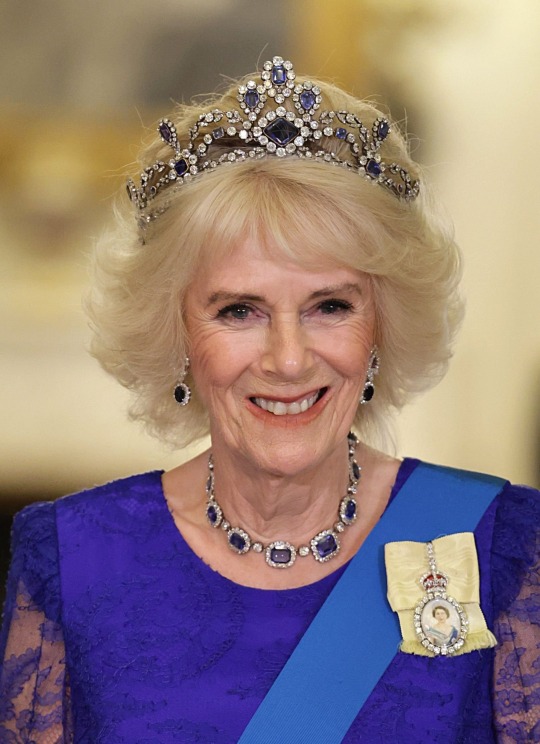
TIARA ALERT: Queen Camilla of the United Kingdom wore Queen Elizabeth II's Sapphire Tiara for the banquet during the state visit from South Africa at Buckingham Palace on 22 November 2022.
#Tiara Alert#Queen Camilla#United Kingdom#British Royal Family#tiara#sapphire#tiaras#diadem#diadems#royal tiaras#jewels#royal jewels#royal#royaltyedit#royals#royalty#jewellery#jewelry#crown#crowns#crown jewels
279 notes
·
View notes
Text
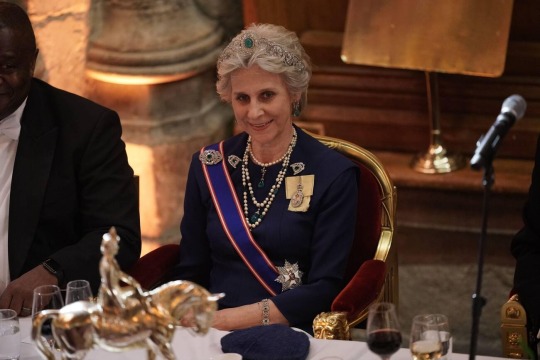
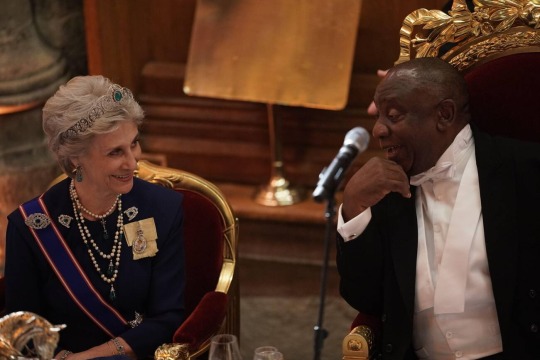
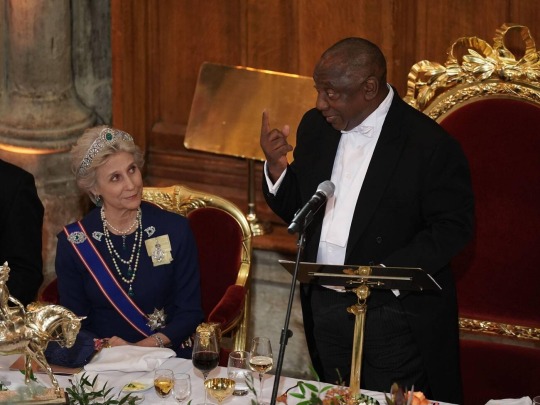
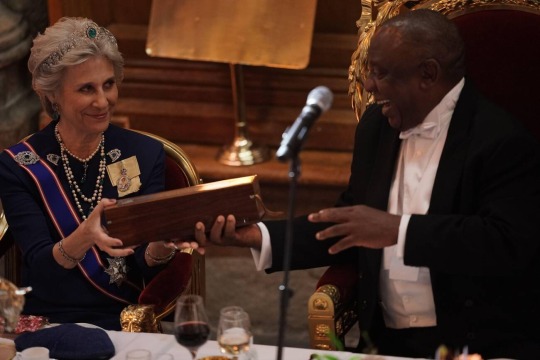
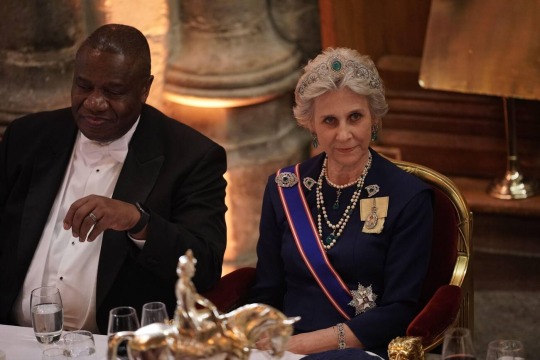
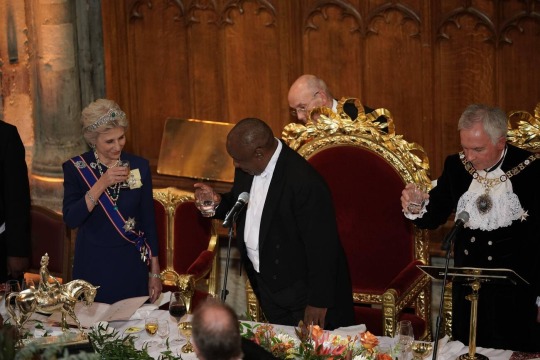
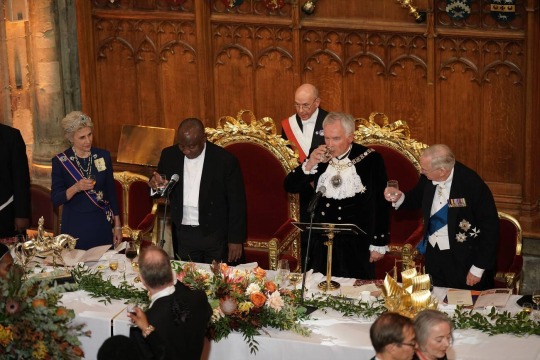
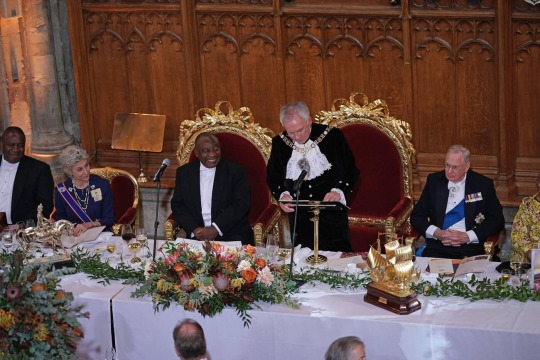
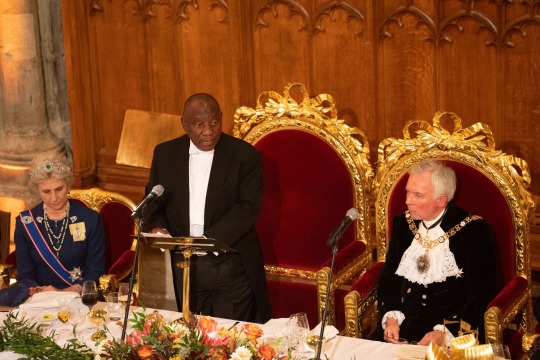
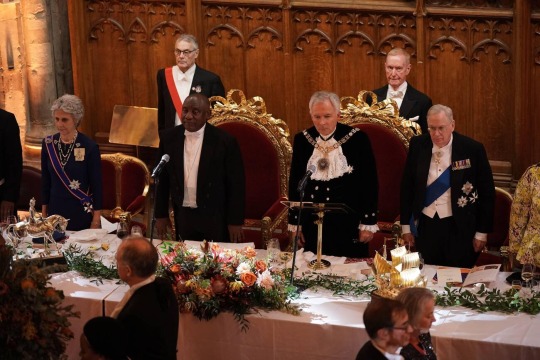
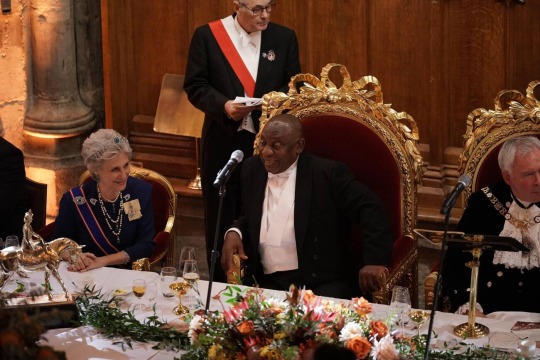
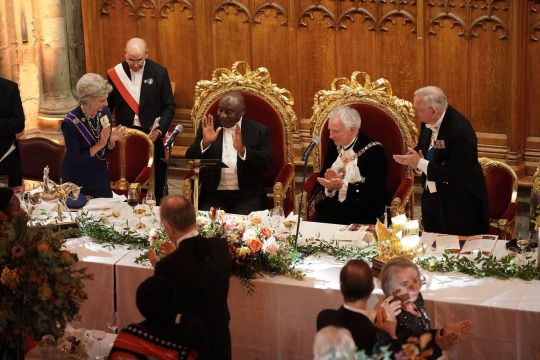
23 November 2022
The Duchess of Gloucester, President Cyril Ramaphosa of South Africa, the Lord Mayor of London, Nicholas Lyons and the Duke of Gloucester during a banquet at the Guildhall in London, given by the Lord Mayor and City of London Corporation, for Mr Ramaphosa's state visit to the UK.
#ma'am please keep smiling#it lights up my entire universe#the most perfect smile#i have a huge crush on her#duchess of gloucester#duke of gloucester#birgitte in tiara#sa state visit
198 notes
·
View notes
Text
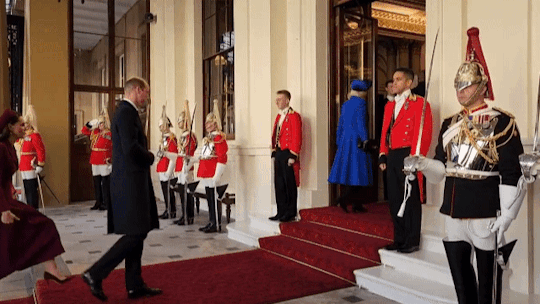
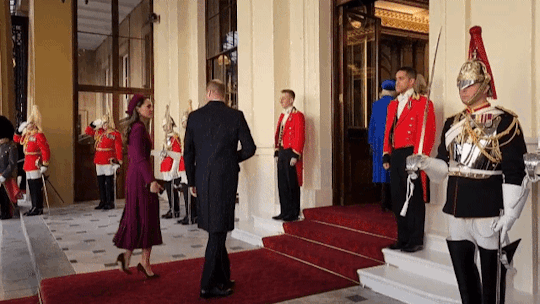
The Prince and Princess of Wales arrive at Buckingham Palace during South Africa's President state visit on November 22, 2022.
#british royal family#princess of wales#kate middleton#prince william#prince of wales#brf#royals#british royals#state visit
185 notes
·
View notes
Photo
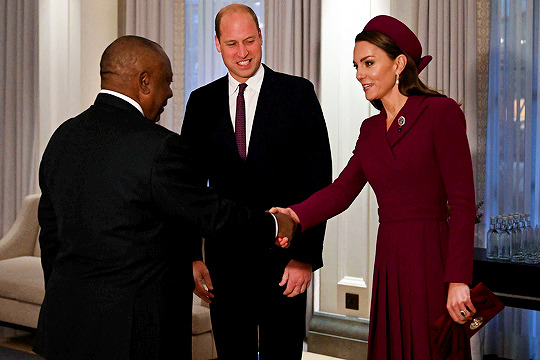
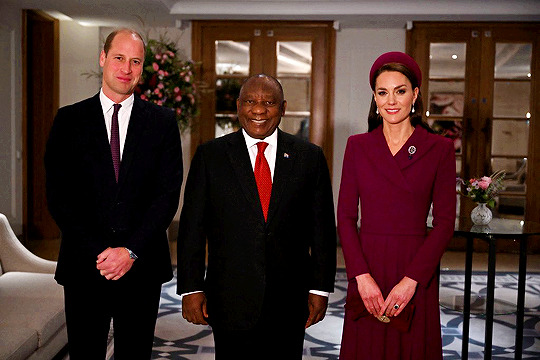
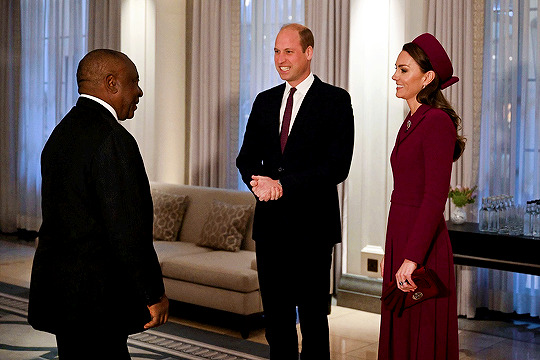
The Prince and Princess of Wales greet the President of the Republic of South Africa, Cyril Ramaphosa, at the Corinthia Hotel. King Charles III is hosting his first state visit as monarch, welcoming South Africa's President to Buckingham Palace | November 22, 2022
168 notes
·
View notes
Photo
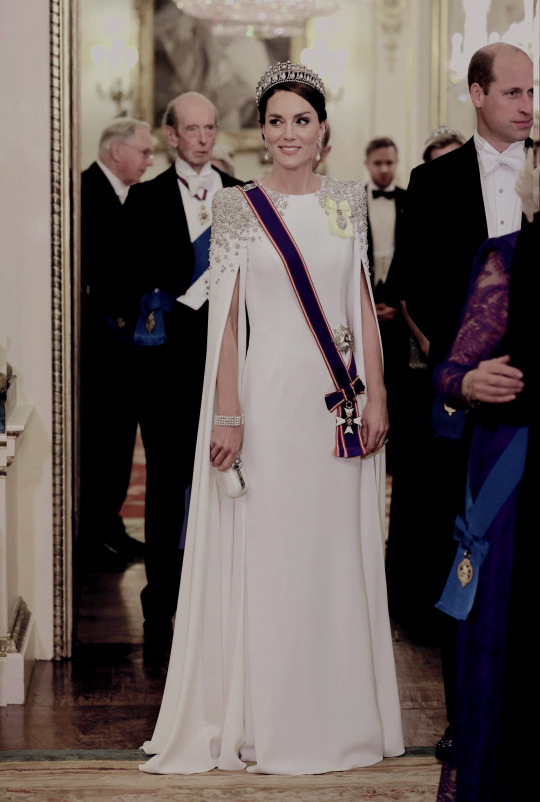
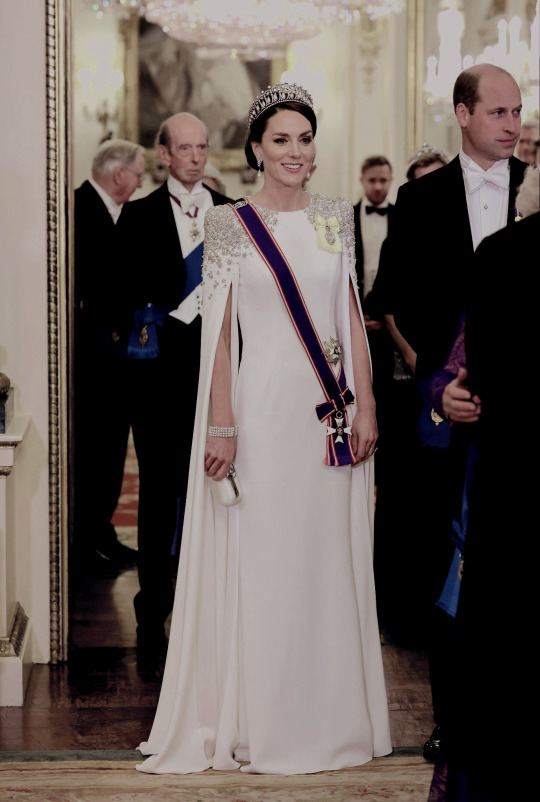
The Prince and Princess of Wales. 22/11/2022.
#Kate middleton#princess of wales#prince william#prince of wales#2022#nov22#state events#tiara events#South Africa state visit 2022
158 notes
·
View notes
Photo
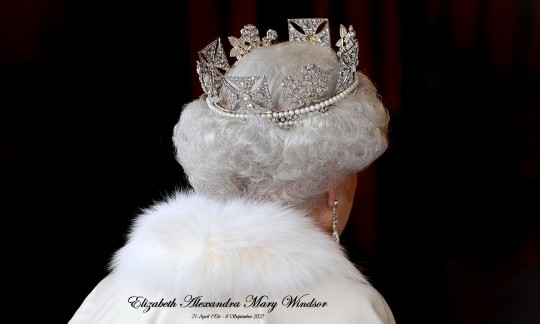
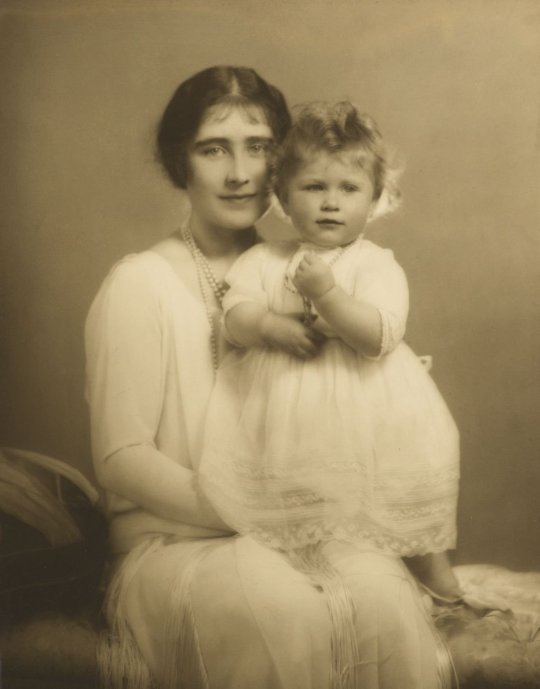

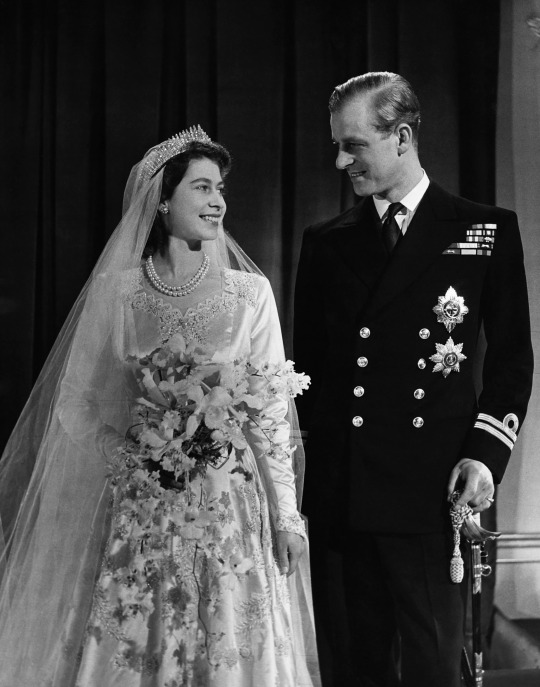
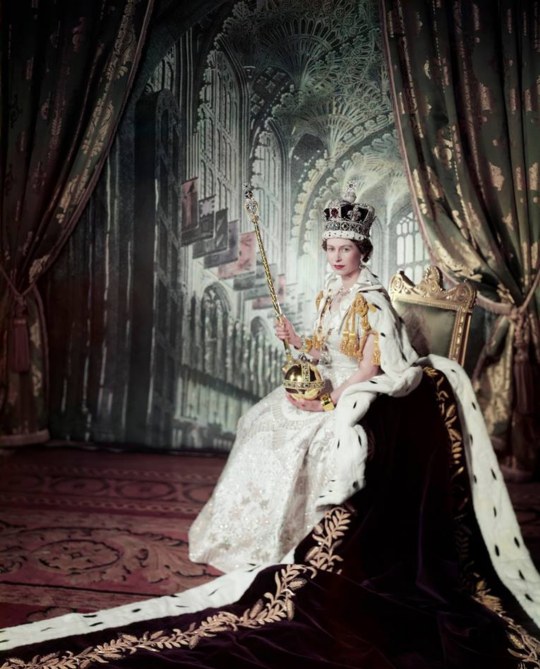


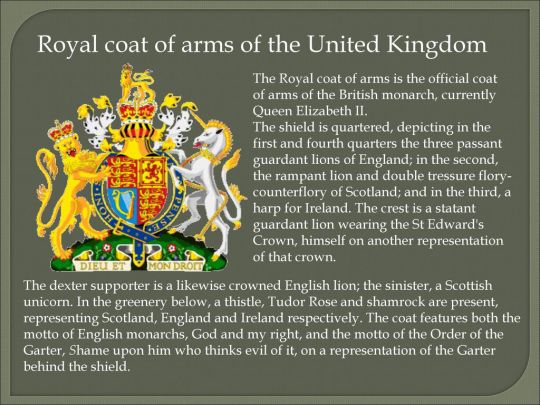
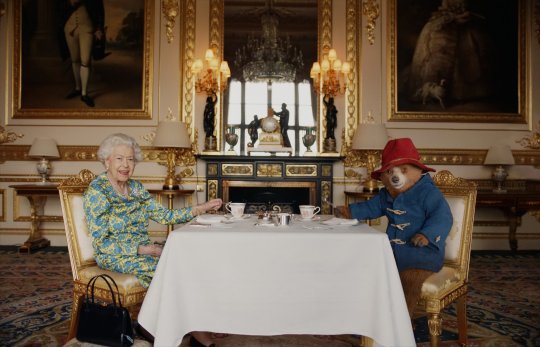
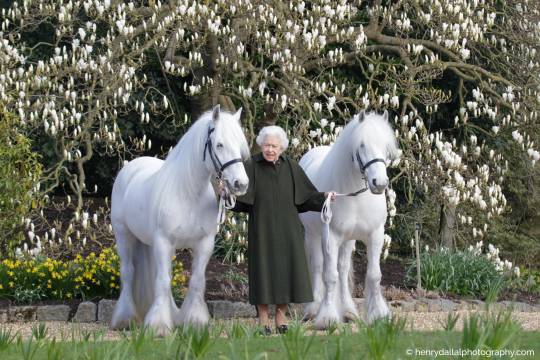
Queen Elizabeth II has died
Queen Elizabeth II, the United Kingdom’ s longest-serving monarch, has died at Balmoral aged 96, after reigning for 70 years.
Elizabeth II (Elizabeth Alexandra Mary; 21 April 1926 – 8 September 2022) was Queen of the United Kingdom and 14 other Commonwealth realms from 6 February 1952 until her death on 8 September 2022.
Her reign of 70 years and 214 days was the longest of any British monarch and the second longest recorded of any monarch of a sovereign country.
Elizabeth was born in Mayfair, London, as the first child of the Duke and Duchess of York (later King George VI and Queen Elizabeth). Her father acceded to the throne in 1936 upon the abdication of his brother, King Edward VIII, making Elizabeth the heir presumptive.
She was educated privately at home and began to undertake public duties during the Second World War, serving in the Auxiliary Territorial Service. In November 1947, she married Philip Mountbatten, a former prince of Greece and Denmark, and their marriage lasted 73 years until his death in April 2021. They had four children together: Charles III; Anne, Princess Royal; Prince Andrew, Duke of York; and Prince Edward, Earl of Wessex.
When her father died in February 1952, Elizabeth—then 25 years old—became queen regnant of seven independent Commonwealth countries: the United Kingdom, Canada, Australia, New Zealand, South Africa, Pakistan, and Ceylon (known today as Sri Lanka), as well as Head of the Commonwealth. Elizabeth reigned as a constitutional monarch through major political changes such as the Troubles in Northern Ireland, devolution in the United Kingdom, the decolonization of Africa, and the United Kingdom's accession to the European Communities and withdrawal from the European Union.
The number of her realms varied over time as territories have gained independence and some realms have become republics. Her many historic visits and meetings include state visits to China in 1986, Russia in 1994, the Republic of Ireland in 2011, and visits to or from five popes.
Significant events include Elizabeth's coronation in 1953 and the celebrations of her Silver, Golden, Diamond, and Platinum Jubilees in 1977, 2002, 2012, and 2022, respectively.
Elizabeth was the longest-lived and longest-reigning British monarch, the oldest and longest-serving incumbent head of state, and the second-longest verifiable reigning sovereign monarch in world history, only behind Louis XIV of France.
She faced occasional republican sentiment and media criticism of her family, particularly after the breakdowns of her children's marriages, her annus horribilis in 1992, and the death of her former daughter-in-law Diana, Princess of Wales, in 1997.
However, support for the monarchy in the United Kingdom remained consistently high, as did her personal popularity. Elizabeth died on 8 September 2022 at Balmoral Castle, Aberdeenshire.
“The Queen is dead, Long live King Charles III”
The Duchess of York with Princess Elizabeth, 30 June 1927 by Marcus Adams (The Royal Collection Trust),
Princess Elizabeth in uniform (1942) by Cecil Beaton (The Royal Collection Trust),
Princess Elizabeth and The Duke of Edinburgh on their wedding day, 20th November 1947 by Sterling Henry Nahum ‘Baron’ (The Royal Collection Trust),
Queen Elizabeth II poses on her Coronation Day on June 2, 1953, in London (Photography by Cecil Beaton),
Queen Elizabeth II with Prince Philip, Duke of Edinburgh and family - 16 Mar 1960 by Cecil Beaton (From the Collection of Queen Elizabeth The Queen Mother),
Queen Elizabeth II and her son, the Prince of Wales, out riding at Windsor Castle I May 18, 1961 (PA),
The Royal coat of arms of the United Kingdom used outside of Scotland,
Queen Elizabeth II Platinum Jubilee 2022 - Platinum Party At The Palace. The Queen Elizabeth II and Paddington Bear having cream tea at Buckingham Palace (BBC Platinum Party at the Palace),
Portrait of Queen Elizabeth II released by The Royal Windsor Horse Show on April 20, 2022 to mark the occasion of her 96th birthday.
#rip#queen elizabeth ii#elizabeth II#queen elizabeth#monarchy#united kingdom#royal#platinium junilee#windsor#markus adams#cecil beaton#theroyalcollectiontrust#paddington#bbc#balmoral#diana#king charles III#princess anne#prince andrew#prince edward#liveunique#history#britsh history#british royality
345 notes
·
View notes
Text
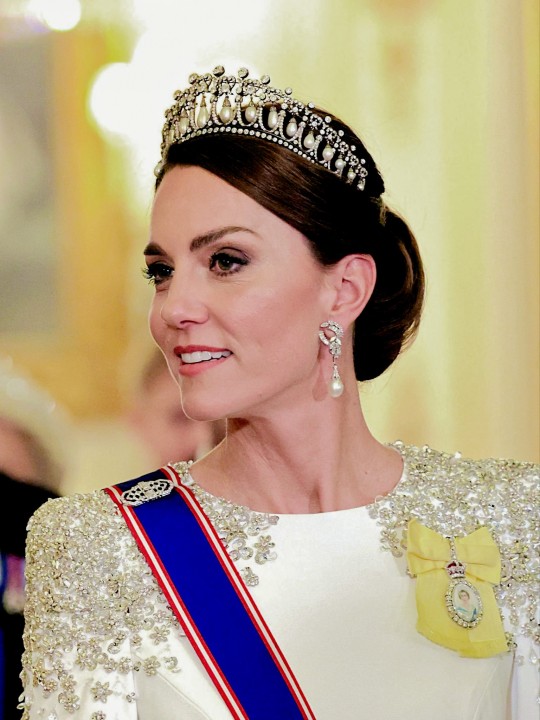
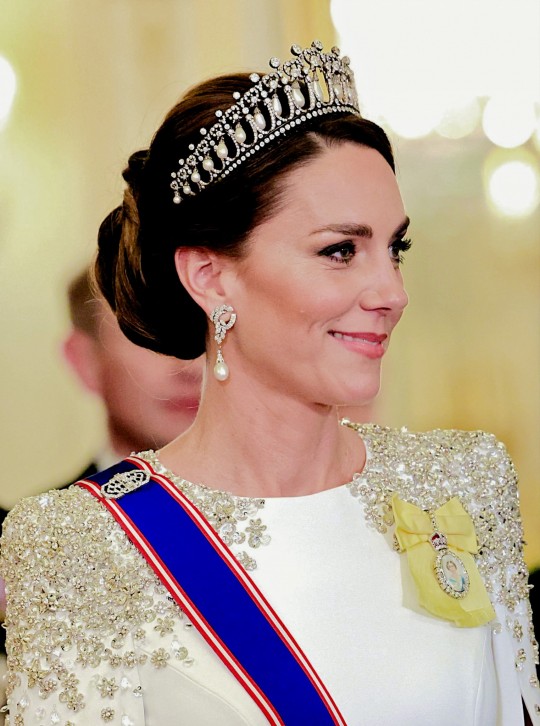
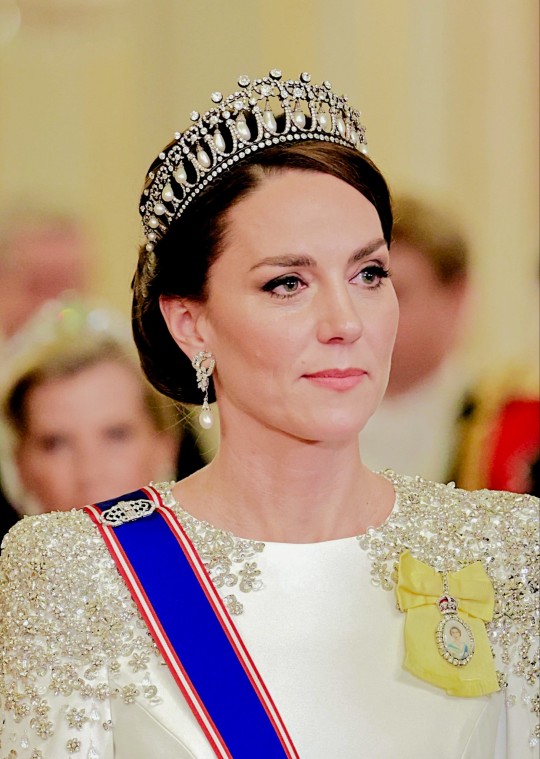
The Princess of Wales attends a State Banquet for President Cyril Ramaphosa on day 1 of his state visit to The United Kingdom, at Buckingham Palace in London, England -November 22nd 2022.
#princess of wales#british royal family#england#2022#november 2022#state visit#state visit 2022#south africa state visit 2022#south africa state visit#the wales#my edit
134 notes
·
View notes
Photo

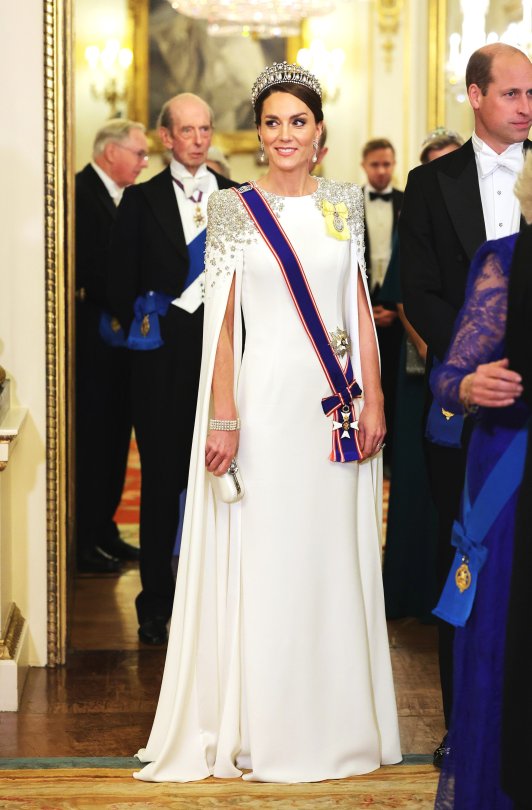
December 6, 2022: The Princess of Wales attends the state dinner for South Africa at Buckingham Palace.
#princess of wales#princess kate#british royal family#brf#december 2022#state visits#state dinners#south africa to uk 2022#tiaras#white tie#kate's engagements#mine
17 notes
·
View notes
Text
Across the globe, a diverse group of nations that view world politics differently from the United States are rising and flexing their diplomatic muscle in ways that are complicating American statecraft. From Africa to Latin America, to the Middle East and Asia, these emerging powers refuse to fit into traditional U.S. thinking about the world order. The successful pursuit of American interests in the mid-21st century calls for a strategy that attracts them toward the United States and its ideals but without expecting them to line up in lockstep with Washington.
“We refuse to be a pawn in a new cold war,” Indonesian President Joko Widodo, known as Jokowi, said in November 2022. His views are shared in some form or another by leaders of Argentina, Brazil, India, Mexico, Nigeria, Saudi Arabia, South Africa, Thailand, and Turkey. All 10 of these nations are either in the G-20 or have economies large enough to warrant membership. A majority of them have populations larger than Germany’s. Collectively, they make up around a third of the world’s population and a fifth of its economic production, while also constituting a major share of the so-called global south’s population and economic production.
In the next two decades, emerging powers like these will climb the ranks of the world’s largest economies and populations, reshaping the structure of world politics in the process. Their diplomacy is increasingly ambitious. And they are taking positions that run counter to those of the United States with growing boldness. Washington and its allies should accept not only that these powers are emerging, but also that as they grow stronger, they will not align with Washington’s preferences on many international issues, especially when it comes to Russia and China.
When Russia invaded Ukraine in February 2022, most of these powers declined to join the U.S.-led coalition to support Ukraine, refusing to take concrete action with sanctions on Russia or weapons for Kyiv. Some emerging powers, such as India and Turkey, even expanded economic ties with Russia.
Meanwhile, several of them pursued active diplomacy to end the war, challenging the U.S. policy of supporting Ukraine “as long as it takes.” Brazilian President Luiz Inácio Lula da Silva, for example, pitched a plan to assemble a peace club to end the war and urged Washington to “stop encouraging war and start talking about peace.” Separately, Jokowi visited Kyiv and then Moscow, urging Ukrainian President Volodymyr Zelensky and Russian President Vladimir Putin to start a dialogue. South Africa led a delegation of African leaders to end the war, and Turkish President Recep Tayyip Erdogan has maintained a working relationship with Putin and sought to keep diplomatic channels open.
Most of these emerging powers also have warm ties with Beijing. They are reluctant to do anything that would endanger their economic relations with China. On a visit to Beijing in 2023, for example, Lula pledged to work with China to “balance world geopolitics”—a phrase that implied upending American global primacy. Even India, which sees China as an adversary and has grown much closer to the United States in recent years, is very unlikely to back the United States militarily in the event of a war over Taiwan.
Washington thus needs to avoid the urge to frame this world historical moment as a neo-Cold War ideological struggle. When the United States appeals to the emerging powers to sacrifice their interests for the liberal world order, they suspect that it is simply trying to woo them for its hard-power struggles with Russia and China. Their officials are quick to cite the 2003 Iraq War as evidence that Washington is not so committed as it claims to the liberal international order. They point to the many cases where the United States has compromised on its high principles and backed autocrats. President Joe Biden’s support for Israel’s campaign in Gaza has only given them another reason to doubt the veracity of American claims to exceptional moral authority.
Most of these emerging powers have limited political headroom anyway for ideological struggles of the kind that so often animate U.S. foreign policy. Indian Foreign Minister S. Jaishankar drove this point home when he pointed out that Europe’s ability to wean itself from Russian energy was a luxury that India did not have. “I have a population at $2,000 [per capita annual income],” he said. “I also need energy, and I am not in a position to pay high prices for oil.”
Given frictions between Washington and so many emerging powers of late, it can be tempting to disregard them and focus solely on countering Beijing and Moscow. But this would be a mistake. The emerging powers don’t pose a threat of the kind that U.S. adversaries can, but they also can’t just be ignored. China and Russia are certainly not going to ignore them—in fact, they are actively courting their leaders for political ties and market access with the hope of building a network of political and economic partners to obviate the need for ties to the West.
The emerging powers are also very open to China’s backing for alternative international institutions, such as the BRICS New Development Bank, that offer the prospect of infusions of capital without the bothersome conditions that accompany Western loans. They are critical of many aspects of the U.S.-led international order, which they see as dominated by former colonial powers and unfairly structured to serve the interests of the world’s wealthiest nations.
The good news for Washington is that the emerging powers don’t want to be vassals of China any more than they want to be vassals of America. They are not swing states ready to pick sides in a neo-Cold War. In fact, they actively seek a more fluid and multipolar world, one in which they believe they will have more leverage and freedom of maneuver. Many, moreover, maintain closer economic ties with the United States than China, especially when it comes to investment and defense cooperation.
Washington can make progress with these powers if it puts aside grand ideological framings about the liberal world order and focuses on developing a positive value proposition that offers meaningful benefit to their economic and political development, sovereignty, and aspirations for an enhanced voice in international affairs.
Although trade agreements have become politically unpopular for Republicans and Democrats alike, market access remains a powerful tool the United States has to this end. Other mutually beneficial economic arrangements are imaginable, focused on specific sectors and packages. So is cooperation on infrastructure investments, technology manufacturing, energy transition initiatives, deforestation, public health, and other areas.
Even when making progress on common interests, the emerging powers will also maintain substantial relationships with U.S. adversaries. Washington should not fall into the trap of judging the quality of its relations with the emerging powers by the strength of their ties to China or Russia.
Ultimately, the best way to engage with these nations is to help them strengthen their sovereignty so that they can resist the influence of U.S. adversaries and gain a real stake in sustaining a peaceful world order. This will take time and a change of approach but is likely to pay long-term benefits to America’s prosperity and continued global leadership.
7 notes
·
View notes
Text
NATO is seeking to expand its cooperation structures globally and also intensify its cooperation with Jordan, Indonesia and India. A “NATO-Indonesia meeting” was held yesterday (Wednesday) on the sidelines of the NATO foreign ministers’ meeting in Brussels – a follow-up to talks between Indonesia’s Foreign Minister Retno Marsudi and NATO Secretary General Jens Stoltenberg in mid-June 2022. Last week, a senior NATO official visited Jordan’s capital Amman to promote the establishment of a NATO liaison office. Already back in June, a US Congressional Committee focused on China, had advocated linking India more closely to NATO. India’s External Affairs Minister Subrahmanyam Jaishankar, however, quickly rejected the suggestion. NATO diplomats are quoted saying that the Western military alliance could conceive of cooperating with South Africa or Brazil, for example. These plans would escalate the West’s power struggle against Russia and China, while non-Western alliances such as the Shanghai Cooperation Organization (SCO) are expanding their membership.
Already since some time, NATO has been seeking to expand its cooperation structures into the Asia-Pacific region, for example to include Japan. Early this year, NATO Secretary General Jens Stoltenberg was in Tokyo, among other things, to sign a joint declaration with Prime Minister Fumio Kishida.[1] In addition, it is strengthening its cooperation with South Korea, whose armed forces are participating in NATO cyber defense and are to be involved more intensively in future conventional NATO maneuvers.[2] Japan’s prime minster and South Korea’s president have already regularly attended NATO summits. The Western military alliance is also extending its cooperation with Australia and New Zealand. This development is not without its contradictions. France, for example, opposes the plan to establish a NATO liaison office in Japan, because it considers itself an important Pacific power and does not want NATO’s influence to excessively expand in the Pacific. Nevertheless, the Western military alliance is strengthening its presence in the Asia-Pacific region – with maneuvers conducted by its member states, including Germany (german-foreign-policy.com reported.[3]).[...]
NATO has been cooperating with several Mediterranean countries since 1994 within the framework of its Mediterranean Dialogue and also since 1994, with several Arab Gulf countries as part of its Istanbul Cooperation Initiative.[4] However, the cooperation is not considered very intensive. At the beginning of this week, NATO diplomats have been quoted saying “we remain acutely aware of developments on our southern flank,” and are planning appropriate measures. The possibility of establishing a Liaison Office in Jordan is being explored “as a move to get closer to the ground and develop the relationship in the Middle East.[5] Last week, a senior NATO official visited Jordan’s capital Amman to promote such a liaison office.[6][...]
NATO diplomats informed the online platform “Euractiv” that “many members of the Western military alliance believe that political dialogue does not have to be limited to the southern neighborhood. One can also seek cooperation with states further away. Brazil, South Africa, India, and Indonesia are mentioned as examples.[7][...]
In a paper containing strategic proposals for the U.S. power struggle against China, the Committee also advocated strengthening NATO’s cooperation with India.[8] The proposal caused a stir in the run-up to Indian Prime Minister Narendra Modi’s visit to Washington on June 22. He was able to draw on the fact that India is cooperating militarily in the Quad format with the USA as well as NATO partners Japan and Australia in order to gain leverage against China. Close NATO ties could also facilitate intelligence sharing, allowing New Delhi to access advanced military technology.[9] India’s External Affairs Minister Subrahmanyam Jaishankar, however, rejected Washington’s proposal, stating that the “NATO template does not apply to India”.[10] Indian media explained that New Delhi was still not prepared to be pitted against Russia and to limit its independence.[11] Both would be entailed in close ties to NATO.
The efforts to link third countries around the world more closely to NATO are being undertaken at a time when not only western countries are escalating their power struggles against Russia and above all against China and are therefore tightening their alliance structures. They are also taking place when non-Western alliances are gaining ground. This is true not only for the BRICS, which decided, in August, to admit six new members on January 1, 2024 (german-foreign-policy.com reported [12]). This is also true for the Shanghai Cooperation Organization (SCO), a security alliance centered around Moscow and Beijing that has grown from its original six to currently nine members, including India, Pakistan and Iran, and continues to attract new interested countries. In addition to several countries in Southern Asia and the South Caucasus, SCO “dialogue partners” now include Turkey, Egypt and five Arabian Peninsula states, including Saudi Arabia, the United Arab Emirates and Qatar. Iin light of the BRICS expansion, the admission of additional countries as full SCO members is considered quite conceivable. Western dominance will thus be progressively weakened.[13]
12 Oct 23
16 notes
·
View notes